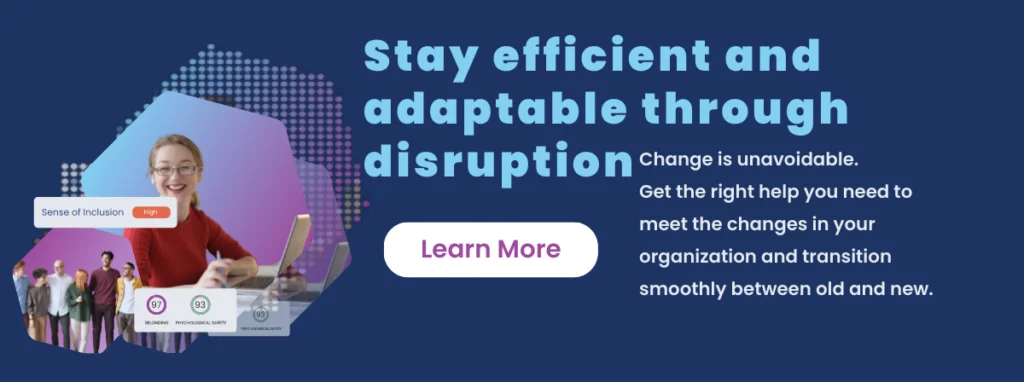Cultural awareness refers to the ability of an individual, team or organization to recognize and appreciate cultural differences in order to successfully interact with people from other backgrounds.
According to the National Center for Cultural Competence, cultural awareness can be defined in one of two ways. First, cultural awareness is understanding, recognizing, and observing both the similarities and differences between multiple cultures.
Second, cultural awareness is a way to see how a person’s behavior is impacted by their culture. It’s essential to value and understand different cultures to be competitive in a diverse business environment and to thrive in an increasingly global world.
For example, if you’re an American business owner, and you want to go to Germany to meet with a customer, you need to know a little more about their culture. In German culture, it’s extremely frowned upon to be late to a meeting. You don’t want to offend and possibly lose a client because you are unaware of certain cultural differences.
When you’re more culturally aware, it’s easier to cultivate an inclusive and more productive environment, where everyone can work as a cohesive team. Understanding other cultures is important because it helps you adapt and adjust the way that you interact with others.
Globalization has made the world a smaller place where we interact with people from different cultures every day. When you become educated about other cultures, it helps strengthen relationships and creates mutual respect between all parties involved.
What Do We Mean by “Culture”?
Culture is made up of a wide variety of characteristics and knowledge of a particular group of people, and spans a person’s race, geophysical location, religion, values, musical tastes, language, and family history, to name a few. All of these factors influence the way you act, speak, and react to others. In the United States, we tend to think of culture as based solely on race. However, this isn’t true.
The term “culture” refers to a group’s shared norms of behavior and attitudes. Understanding this means understanding that people from diverse backgrounds can have comparable ways of thinking about their own experiences, making communication easier, despite superficial difference. Because different cultures may hold different cultural beliefs, the meaning behind various events might be vastly distinct depending on their culture.
For example, some people believe that deadlines are set in stone. In Spanish culture, deadlines are seen more as a guideline than the actual due date. With this type of cultural awareness, you can save yourself the frustration of a missed deadline and factor in a little extra time.
Cultural awareness makes it easier for you to understand the influences that have created the mindset of another person and their actions.
Why Is Cultural Awareness Important?
Cultural awareness is vital because understanding people’s unique backgrounds and traditions can help you build stronger relationships with others.
Here are a few reasons why cultural awareness is important:
- It can help you see how your culture shapes the way that you perceive other people, actions and events.
- You can better understand the people you know and new people that you meet.
- The ability to understand why people behave a certain way will lead to mutual empathy, respect and appreciation of our differences.
- You become more sensitive and empathetic to the needs of others around you.
- Building trust is easier when you understand and practice cultural awareness.
- Cultural awareness can make you a better leader or manager.
- It can help you improve your relationships with people of cultures different from your own.
- Creating an environment of cultural awareness can help teams communicate more effectively and work to create a more inclusive — and therefore more positive and successful — work environment for everyone.
By understanding that there are cultural differences between people of different backgrounds, you’ll be more mindful and sensitive to those differences, so you can adapt and develop greater insight on how to best manage and work with a diverse team.
Cultural awareness is important for everyone. It’s especially important if you’re in a leadership position. It’s almost guaranteed that the people you manage, teach, or guide will come from a variety of cultural backgrounds.
How to Develop Cultural Awareness
To develop cultural awareness, you must be open to learning how others view the world and why. When you engage with people of different backgrounds, it’s important that you are receptive to understanding and respecting cultural differences. This can help you empathize with others and more effectively lead your group. You also want your team to become more culturally aware, so that together you create an inclusive and compassionate work environment.
Here are a few tips and tricks for developing cultural awareness:
Open Communication
This is especially important if you’re a manager. Strive to foster an environment where everyone feels safe and valued when they express their thoughts and views. It’s also a good idea to have an open-door policy for anyone who feels offended or misunderstood.
Celebrate Holidays and Events
When you’re working with a group of people or managing them, you can develop cultural awareness by encouraging open communication and a safe environment where people can talk about holidays important to their culture and when appropriate, even celebrate together. When you celebrate or recognize holidays and events of other cultures, it helps make your team more aware of other traditions and creates sensitivity to their differences.
Revisit Organizational Mission
If you’re a manager, review all the documentation on your company. You want to make sure the mission statement and all the information about your company from website content to pamphlets are inclusive.
While you’re doing this, look at the cultural makeup of your team. Are you representing each culture with the organizational values and mission statement? If not, it might be time to rethink these things. You want your company or group to practice cultural awareness and that starts with the mission statement.
Observe and Listen
When you’re working with employees, teammates and customers from different cultures, you can learn a lot by observing them and listening to what they say.
In time, it’s a good idea to discover the underlying reasons why they do and say things the way they do. A more diverse staff has a lot to bring to the table, and you want them to share their ideas and culture to help make positive changes within your team and company.
Cultural Awareness Training
As a manager, you might wonder if cultural awareness training is the right move for your team. It almost always is. In a globalized society, cultural awareness training is as essential for a company as is processing payroll. The workforce is becoming more diverse, and you want everyone to feel welcome. What’s more, your customer base is growing more diverse as well, and higher cultural awareness can help you connect and win customers.
Cultural awareness training can help each team member be more aware of their own perspective as well as those of their colleagues. You’ll find this type of training can help your employees work better together as a team.
Most cultural awareness training is done in a workshop setting. You can determine the length and intensity of the material presented. If your team is diverse and already shows signs of cultural awareness, you might opt for a short workshop. However, if you’re dealing with staff that hasn’t experienced diversity in the workplace before now, it might take a few sessions and a deep dive into the topic.
Cultural Awareness Is Important. Don’t Neglect It.
In a business environment that is more and more diverse and global in nature, it is essential to understand cultural awareness and practice it. It will help you create a respectful environment and enable you to better communicate with your team.
At RallyBright, we understand how important it is for your team to work well together, and we’re ready to partner with you to evaluate your team’s performance and create a plan to improve. Drop us a line and let’s talk!



